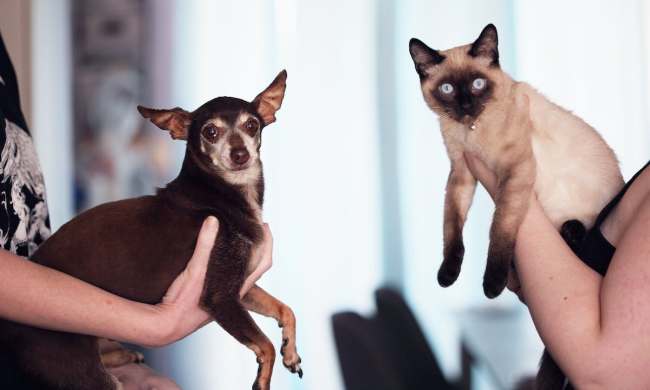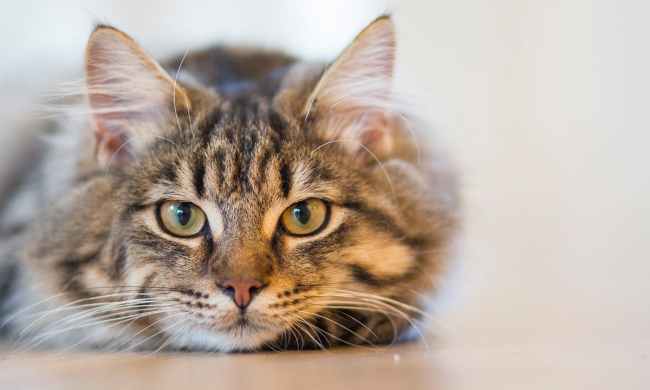Plant-based diets have made headlines in human health and nutrition, with studies showing their benefits for physical health. Naturally, you want what is best for your cat, and diet is a significant way to keep your furry friend healthy and thriving.
We’re stating the obvious here when we say cats and people aren’t the same — not just because of the four-legged versus two-legged feature. Since we’re distinct species, our dietary needs are different. You may have also heard that your cat is a carnivore. Are cats carnivores, though? Is a bowl packed with animal protein good for them, or should you shift to something resembling the feline version of the Mediterranean diet? Your pet’s veterinarian is also the best resource for information about your individual cat’s nutrition needs. However, we can settle the beef on questions about a cat’s general diet essentials.
Are cats carnivores?

Let’s cut right to the chase: Yes, cats are carnivores — obligate carnivores, to be exact. Obligate carnivores are “true carnivores,” meaning your cat isn’t requiring a diet heavy in animal protein products because of a TikTok influencer. Instead, they’re responding to their body’s genuine need to get all its nutrients from animal flesh.
Domestic indoor cats aren’t hunting like their wild ancestors and cousins (though they may enjoy window grocery hopping for wildlife). Instead, they get their essential amino acids (building-block proteins) from high-protein, low-carbohydrate commercial cat food, which contains animal protein products and mirrors what Kitty would consume if they were a wild hunter. A cat’s health can suffer for even a day or two without these vital building blocks.
You may want to learn more about or feed your cat a vegetarian or vegan diet for health or personal reasons. While these desires are understandable, cats genuinely need animal protein to stay in the best health possible. You’ll want to avoid switching to a vegetarian or vegan diet with your cat. Your cat’s vet can let you know of any reason why your pet needs to switch to a different diet, though.
Also, cats can consume plant products in small amounts, like blueberries. These foods should be seen as sometimes treats rather than nutritional sources — you want your cat to be plenty hungry for the food designed specifically for their body, and that helps them thrive.
What should I feed my cat?

Most kitties thrive on commercial cat food formulated for their age and weight. You’ll find these specifications on the cat food bag. While inspecting the bag, look for the AAFCO label, which indicates the food meets nutritional standards.
A cat diet can come in wet or dry form. Dry food (kibble) usually comes in a large bag and easily goes in a bowl with little cleanup. Wet food comes in pouches or cans and often has flavors like beef, fish, and chicken. Dry food contains the nutrients most cats need. However, wet food offers additional calories (if required) and hydration (vital if a cat has kidney disease). It may also be easier for senior cats to eat, especially if they’ve lost teeth.
Complementary foods like treats are just that — treats, not meal replacements. Ensure your cat is eating their regular food, and pull back on treats if you notice an appetite change.
How to get a cat to eat their food

Cats give toddlers a run for their money in the pickiest eaters category. They can get finicky about taste, texture, and smell. You may be tempted to switch them to a different diet, like a vegan one — avoid that. Cats require a specific, obligate carnivore diet to stay in tiptop shape. Instead, try these tips:
- Taste test. Your vet may have smaller (possibly free) samples of commercial cat foods. Let Kitty sample different ones and decide for themselves.
- Transition slowly. Whether you’re transitioning from kitten to adult food or need to switch formulas for budget reasons, try to make the process slow. For instance, you might offer 80% old food and 20% new food for a few days, then flip to 50-50 and go from there.
- Check for underlying conditions. While discussing issues with the vet, ensure they rule out underlying conditions — appetite changes can be a sign of health issues.
Concluding thoughts

Cats are obligate carnivores, meaning they consume a diet almost exclusively (or completely) containing animal protein. Unlike humans, who are omnivores (or vegetarians and vegans), cats don’t need a diet rich in plants. In fact, they don’t need plants at all (but can have them in small amounts as treats, such as blueberries).
Since your sofa lion isn’t hunting in the safari any time soon, opt for a commercial dry food with the AAFCO seal appropriate for your cat’s age and weight. Wet food isn’t necessary but may be desired by your cat. Your vet can address concerns about picky eating, weight, and diet choices.




